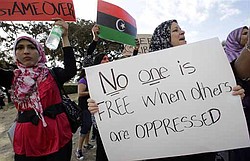Gadhafi’s hold on Libya weakens
AP
Libyan-American citizen Jamila Rashed, right, of Denton, Texas, holds a sign as she joins nearly 200 others during a rally at Dealey Plaza, Sunday, Feb. 20, 2011, in Dallas. Rashed said that she responded to a message on a social network site that called for the rally at the downtown Dallas plaza in support of a freedom in the country of Libya.
Associated Press
CAIRO
Deep cracks opened in Moammar Gadhafi’s regime Monday, with Libyan government officials at home and abroad resigning, air- force pilots defecting and a bloody crackdown on protest in the capital of Tripoli, where cars and buildings were burned. World leaders were outraged at the “vicious forms of repression” used against the demonstrators.
The mercurial leader appeared on Libyan state television for less than a minute early today to dispel rumors that he had fled. Sitting in a car in front of what appeared to be his residence and holding an umbrella out of the passenger-side door, he told an interviewer that he had wanted to go to the capital’s Green Square to talk to his supporters, but the rain stopped him.
“I am here to show that I am in Tripoli and not in Venezuela. Don’t believe those misleading dog stations,” he said, referring to the media reports that he had left the country.
Pro-Gadhafi militia drove through Tripoli with loudspeakers and told people not to leave their homes, witnesses said, as security forces sought to keep the unrest that swept eastern parts of the country — leaving the second-largest city of Benghazi in protesters’ control — from overwhelming the capital of 2 million people.
State TV said the military had “stormed the hideouts of saboteurs” and urged the public to back security forces. Protesters called for a demonstration in Tripoli’s central Green Square and in front of Gadhafi’s residence, but witnesses in various neighborhoods described a scene of intimidation: helicopters hovering above the main seaside boulevard and pro-Gadhafi gunmen firing from moving cars and even shooting at the facades of homes to terrify the population.
Youths trying to gather in the streets scattered and ran for cover amid gunfire, according to several witnesses, who, like many reached in Tripoli by The Associated Press, spoke on condition of anonymity for fear of reprisal. They said people wept over bodies of the dead left in the street.
Warplanes swooped low over Tripoli in the evening, and snipers took up position on roofs, apparently to stop people outside the capital from joining protests, according to Mohammed Abdul-Malek, a London-based opposition activist in touch with residents.
Gadhafi appeared to have lost the support of at least one major tribe, several military units and his own diplomats, including the delegation to the United Nations.
Deputy U.N. Ambassador Ibrahim Dabbashi accused the longest-serving Arab leader of committing genocide against his own people in the current crisis.
The eruption of turmoil in the capital after seven days of protests and bloody clashes in Libya’s eastern cities sharply escalated the challenge to Gadhafi.
His security forces have unleashed the bloodiest crackdown of any Arab country against the wave of protests sweeping the region, which toppled leaders of Egypt and Tunisia.
At least 233 people have been killed so far, according to New York-based Human Rights Watch.
The difficulty in getting information from Libya made obtaining a precise death toll impossible.
 43
43

